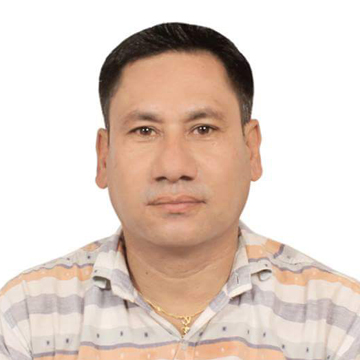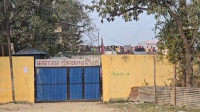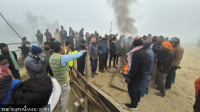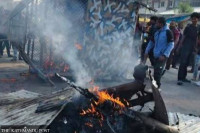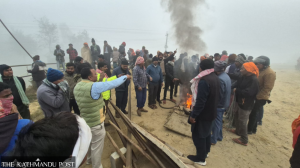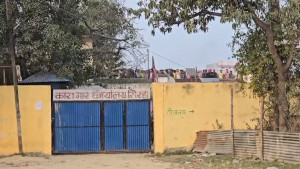Madhesh Province
Unfinished bridges force villagers to risk lives between home and fields
From Bagmati to Kamala rivers, government’s broken promises compel hundreds to take perilous boat crossings every day.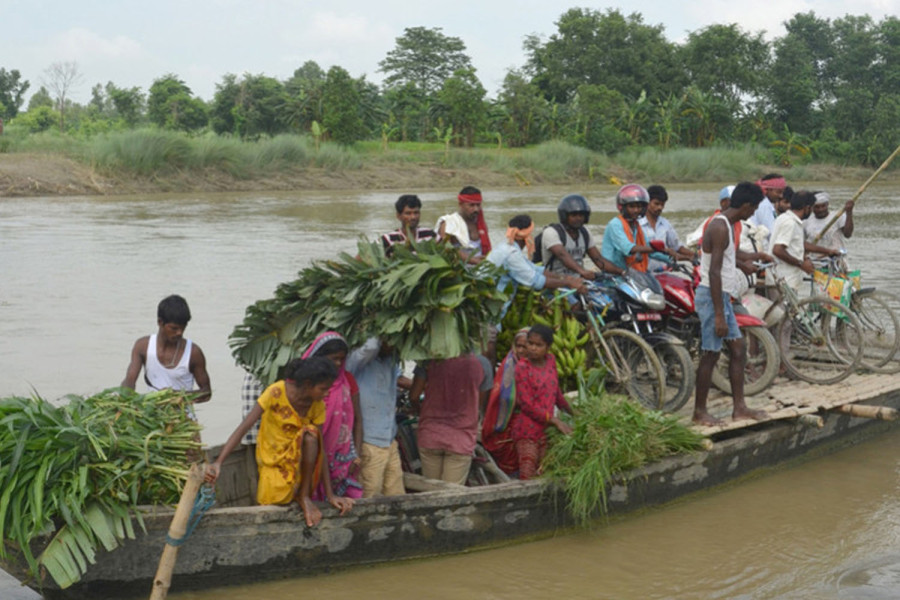
Shiva Puri
Saroj Das, aged 57, of Badaharwa in ward 5 of Durga Bhagawati Rural Municipality boards a shaky old wooden boat to cross the swollen Bagmati river and reach his farmland on the opposite bank. For Das this perilous journey is not a matter of choice, but of compulsion. With no bridge connecting the two sides, Das and hundreds like him face daily risks, especially during the monsoon when the river turns fierce and unpredictable.
“I have pleaded for years for a bridge. In the rainy season, boating becomes life-threatening, but we have no alternative,” Das said, recalling the three deadly boat accidents in the area over the past 15 years. Had the under construction Badaharwa bridge connecting Sarlahi and Rautahat completed timely, many villagers like Das would not have risked their lives to cross the river.
Back in 2010, hopes were raised when then Prime Minister Madhav Kumar Nepal laid the foundation stone of a bridge over the Bagmati river in Badaharwa. Locals celebrated the promise of safe travel. “We thought the days of risking lives on boats were finally over,” recalled Shambhu Singh, chairman of Durga Bhagawati Rural Municipality. But 15 years later, the bridge remains incomplete and boats remain the only option, turning daily commutes into life-or-death situations.
Over the years, the Bagmati river has changed its course, leaving around 400 households in ward 5 of Durga Bhagawati Rural Municipality on the Sarlahi side. Similarly, Rajdevi Municipality’s Seharwa village has also been cut off by the river. Many villagers have homes on one side and farmland on the other, forcing them to rely on fragile boats throughout the year.
“We have our house on one side, our land on the other. And there is no other way to cross the river,” said Subas Sah of Badaharwa. In winter, villagers construct a temporary bamboo bridge to facilitate movement, but monsoon washes it away every year, leaving them completely dependent on boats.
The dangers of this dependence are well-documented. In August 2014, a boat capsized at Bagmati Ghat, leaving three people missing. Two bodies were recovered downstream while one remains unaccounted for. Fifty people had boarded the overloaded boat to cross the river for agricultural work when it flipped in the strong currents. The boat was heading to Rajawada of Rautahat from Bairiya of Sarlahi when it capsized.
During the dry season, the river’s water level drops but remains too deep to cross on foot. Residents continue to ferry motorcycles and bicycles on these fragile boats, further increasing the risk. “We don’t charge villagers, but those bringing bikes usually pay voluntarily,” said Ajay Sahani, who manages the boat service at Badaharwa.
This grim scenario is not limited to Badaharwa village alone. At Tikuliya, in ward 4 of Gaur Municipality, another promised bridge remains incomplete despite being inaugurated in 2014 by the then Prime Minister Sushil Koirala. Here too, locals are forced onto boats year after year.
In August 2017, a boat carrying festival-goers and farmers capsized in the Lalbaikaiya river at Tikuliya Ghat, killing five people. “Had the bridge been built on time, we wouldn’t have lost our people,” said Bharat Raut of Tikuliya, who lost his wife Indu Devi in that accident.
Construction at both Badaharwa and Tikuliaghat stalled for years due to the river changing its course and negligence of the contractor. Although fresh contracts have been awarded, progress remains painfully slow. The unfinished bridges have left thousands from Rautahat and Sarlahi districts cut off, forcing farmers to use boats to harvest and transport their produce.
The bridge in Tikuliya Ghat was supposed to connect dozens of villages—including Banjaraha, Baraiya, Mathiya, Jokaha, Bairiya, Akolawa, Rampur—to Gaur, the district headquarters of Rautahat. The bridge project was handed over to the controversial Pappu Construction in July 2014. The company was supposed to complete the Rs149.3 million project by July 2017. But it could not be completed due to the contractor's negligence.
The problem extends beyond Bagmati river. Across the Kamala river, which separates Siraha and Dhanusha districts, residents share the similar stories of neglect and danger. Despite 13 years of bridge construction, the Kamala river bridge remains incomplete. Locals are forced to ferry motorcycles, bicycles, and themselves across on overcrowded, outdated boats.
“During floods, the river gets dangerously swollen and boats capsize often. Yet we have no choice but to risk our lives,” said Kiran Yadav, a resident of Siraha. “There are no life jackets, no safety measures. We cross at the mercy of the river,” he added.
At Chikna Ghat, two boats ferry dozens of people along with several motorcycles in a single trip. Overcrowding is routine, and during monsoon, strong river currents further heighten the risk of capsizing. “We keep warning people not to overload, but many force themselves aboard, making boats unstable,” said boat operator Shankar Sahani.
Locals said they even built temporary wooden bridges during the dry season, charging small fees to cross, but monsoon floods sweep these away every year. From the Bagmati to the Kamala, residents of southern plains are trapped in an endless cycle of broken promises and deadly river crossings.
As successive governments reiterate their commitments to infrastructure development in the plains, the ground reality remains grim. “It has been years of foundation stones and speeches, but there is no bridge to walk on,” lamented Bharat Raut of Tikuliya. “Every monsoon is a gamble with life. Our only hope is that someday the bridge will be completed, before more lives are lost,” he expressed his frustration.




 10.12°C Kathmandu
10.12°C Kathmandu